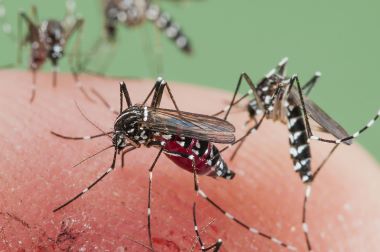IZS - Istituto Zooprofilattico Sperimentale Abruzzo e Molise
Invasive mosquitoes on the rise in Italy: the ISS guide to defend yourself

- Source 2022 Scarafaggi e Blatte - Primer Tema WordPress di GoDaddy
According to the European Centre for Disease Prevention and Control (ECDC), the increase in temperatures in Europe, accompanied by heatwaves, floods, and longer hotter summers, promotes the proliferation of invasive mosquitoes such as Aedes albopictus (the tiger mosquito) and Aedes aegypti. As stated by the ECDC, the increase in mosquito presence poses a higher risk of viral diseases transmission, such as chikungunya, dengue, and West Nile virus, the latter primarily transmitted by native mosquitoes widespread in Italy.
In Italy live several mosquito species, including Aedes albopictus, which is stable throughout the national territory, active during daylight hours, and preferably bites humans. Recently, two other mosquito species, Aedes japonicus and Aedes koreicus, have been introduced in the northeastern regions of Italy and are expanding their range westward. At present, there are no reports of Aedes aegypti introduction in Italy.
Sporadic cases of chikungunya were reported in 2007 and 2017, and dengue in 2020 in Italy. These diseases, typical of tropical areas, can occasionally originate from infected individuals returning from trips and then rapidly transmitted due to the presence of the competent vector, the tiger mosquito. On the other hand, West Nile virus has been endemic in Italy for at least 15 years, causing human infections annually, with periodic epidemics (in 2018 and 2022).
To combat these diseases, the entomology unit at the Italian National Institute of Health (ISS) provides technical and scientific support during investigations in case of arbovirus epidemics. The ISS also hosts the national reference laboratory for arboviruses and coordinates epidemiological surveillance of human infection cases throughout the country, in collaboration with the Ministry of Health and the Regions and Autonomous Provinces.
The Italian National Institute of Health provides a guide to defend against mosquitoes and reduce the risk of contracting diseases transmitted by these insects. The recommendations include the use of repellents, wearing protective clothing such as long pants and long-sleeved shirts, using window screens, and staying in air-conditioned environments. It is also advised to regularly empty containers with stagnant water, change water in pet bowls, and empty children's pools when not in use.
Additional information
Beware of mosquitoes: Italy leads Europe in the number of contracted viral diseases
With summer come mosquitoes: here is how to behave and the mistakes to avoid
Source: The Italian National Institute of Health